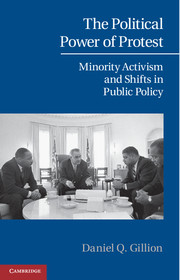Book contents
- Frontmatter
- Contents
- List of Figures
- List of Tables
- Preface
- Acknowledgments
- Introduction
- 1 A Continuum of Information
- 2 Measuring Information in Minority Protest
- 3 Viewing Minority Protest from the Hill
- 4 Knocking on the President’s Door
- 5 Appealing to an Unlikely Branch
- Conclusion
- Appendix A Defining Minority Political Protest
- Appendix B Study Description and Coding Across Multiple Institutions
- Appendix C Time Series Methods
- References
- Index
- References
5 - Appealing to an Unlikely Branch
Minority Political Protest and the Supreme Court
Published online by Cambridge University Press: 05 February 2013
- Frontmatter
- Contents
- List of Figures
- List of Tables
- Preface
- Acknowledgments
- Introduction
- 1 A Continuum of Information
- 2 Measuring Information in Minority Protest
- 3 Viewing Minority Protest from the Hill
- 4 Knocking on the President’s Door
- 5 Appealing to an Unlikely Branch
- Conclusion
- Appendix A Defining Minority Political Protest
- Appendix B Study Description and Coding Across Multiple Institutions
- Appendix C Time Series Methods
- References
- Index
- References
Summary
We couldn’t get anything through Congress… Nothing. We couldn’t even get the anti-lynching bill through. So you had to go to the courts. That was the only place that was a possibility. And we go and look at that and say, “Good God, that ain’t no chance either.” And so some of us said, “Let’s bang it in there and bang it in there, bang it in there, bang it in there.” And now where you going now? You know you can go to the courts if you want to know where we is now. That’s where we is now.
– Thurgood Marshall, interview with Juan Williams, 1989Can the information stemming from minority protest garner a response from the Supreme Court? More specifically, does the Court respond to political behavior that expresses a racial or ethnic minority grievance? Justice Thurgood Marshall was at times indecisive about the answer to this question. When asked directly whether it was useless for minorities to appeal to the Supreme Court, he responded, “I can’t say that, but you see what the record shows” (Williams 1998). This response – neither confirming nor denying the possibility – reveals Justice Marshall’s uncertainty about the effectiveness of minority appeals to the Supreme Court. He was even less certain whether these appeals for government action should be made in the form of political protest.
- Type
- Chapter
- Information
- The Political Power of ProtestMinority Activism and Shifts in Public Policy, pp. 117 - 146Publisher: Cambridge University PressPrint publication year: 2013



